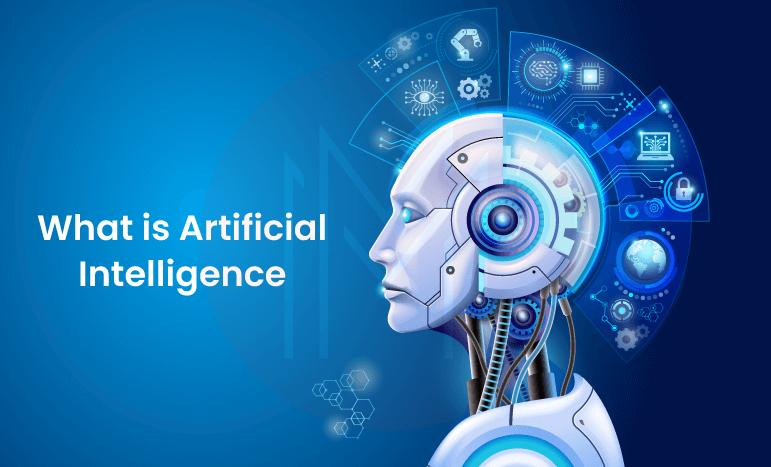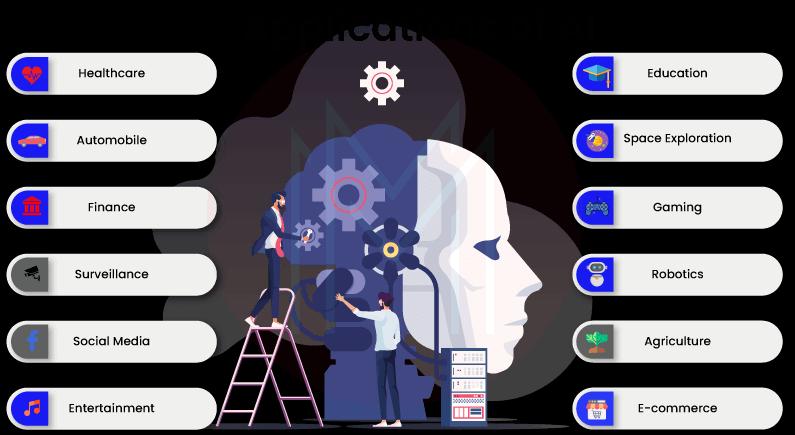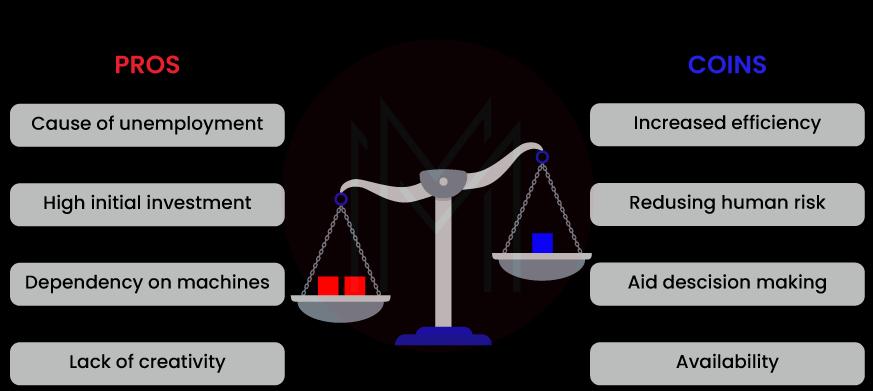- Home
- Blog
- AI and Machine Learning
- Artificial Intelligence Tutorial

- Challenges Faced While Executing Real Life Scenarios With AI
- What is ACUMOS AI
- Artificial Intelligence Interview Questions
- Artificial Intelligence In Education
- Artificial Intelligence Revolution
- Top 10 Artificial Intelligence Technologies
- What Is Artificial Neural Network And How It Works?
- Benefits of Artificial Intelligence
- Genetic Algorithm in Artificial Intelligence
- Artificial Intelligence Neural Network
- Top 5 Reasons why you should learn Artificial Intelligence
- Skill Demands in Artificial Intelligence Job Market
- Whats new in SQL Server 2016
- Why is Artificial Intelligence Important
- The Ultimate Guide to Chatbots
- AI Framework
- Machine Learning (ML) Frameworks
- What is LSTM?
- Best Software Development Courses
- What is Cognitive Computing and How Does it Work?
- What is AIOps - The Beginner's Guide
- What Is ChatGPT
- Artificial Intelligence (AI) Projects and Use Cases
- How to Install TensorFlow?
- n8n Tutorial
The foundation of artificial intelligence (AI) is the development and implementation of algorithms within a dynamic computer environment to achieve the same or similar results as human intelligence. Put another way, artificial intelligence (AI) aims to give computers the ability to reason and act like people.
| Table of Contents - Artificial Intelligence Tutorial |
What is Artificial Intelligence?
AI (Artificial Intelligence) refers to the intelligence demonstrated by machines. It enables us to create machines capable of performing various tasks and precisely addressing problems in the actual world. By automating repetitive tasks, artificial intelligence may boost productivity and efficiency. Additionally, it may generate an immersive, responsive experience and help understand human emotions.

With the help of AI, computers can mimic and surpass humans' cognitive powers. Artificial intelligence (AI) is becoming increasingly integrated into daily life, from the creation of autonomous vehicles to the popularity of virtual assistants like Siri and Alexa. Therefore, businesses across various sectors are increasingly investing in AI systems. Artificial intelligence is a group of many different technologies that work together to give machines the ability to sense, understand, act, and learn like humans. Because AI isn't a singular concept, it's understandable that many people will have various ways of defining it.
AI technology has become crucial to the current economy because AI systems can significantly outperform humans in numerous situations and for many artificial intelligence applications.
| If you would like to Enrich your career with an Artificial Intelligence certified professional, then visit here for the “Artificial Intelligence Certification Course”. This course will help you to achieve excellence in this domain. |
Why is Artificial Intelligence Important?
Today, machines create much more data than people can absorb, understand, and use to make complex decisions. Artificial intelligence is the basis of how computers learn and is the future of making decisions that are hard to understand.
| Related Article: Importance of Artificial Intelligence |
- The importance of artificial intelligence and its succeeding elements have long been understood. They are viewed as methods and instruments for improving the world. And using these high-tech devices doesn't require any special training. You only need to glance around to see that artificial intelligence has streamlined much of your work.
- AI machines are an excellent investment since they speed up your processes while maintaining accuracy and precision. These technologies and their artificial intelligence applications aren't tied to our regular, day-to-day lives; they're also making the globe a better, more error-free place. There are repercussions and implications beyond the scope of this discussion.
- The fact that it may make our lives simpler is the source of its importance. Human effort is greatly reduced by these technologies, which significantly benefit people. They are capable of functioning in an automated manner. Because of this, human intervention is not something that can be sought or seen during the functioning of any components that include this technology.

Understanding Artificial Intelligence
Most people think of robots when they hear "artificial intelligence." Books and films with large budgets often tell stories about humanoid machines that bring havoc to earth. On the other hand, this could not be further from reality.
The premise that AI is built is that the human mind can be characterized so that any task, no matter how complicated, can be easily duplicated and executed by a computer. AI aims to create systems with similar cognitive abilities to those of humans.
Scientists and engineers are making surprisingly rapid strides toward defining mental operations like reasoning, learning, and perception in detail. Some people believe that shortly, engineers will be able to design systems that surpass what humans can learn or understand at present. This position is still held by some people, however, since they argue that all thought processes need subjective value judgments shaped by individual experience.
As technology improves, the old ways of measuring artificial intelligence become less valuable. For example, machines that use optical character recognition to read text or do simple calculations are no longer thought to have artificial intelligence because these tasks are now seen as essential computer functions.
The use of AI is continually expanding, which benefits various businesses. Wiring a machine requires knowledge from various fields, including but not limited to mathematics, computer science, languages, psychology, and others.
[Related Article: What is AIOps]
Types of Artificial Intelligence
While there are many other ways to categorize artificial intelligence, the two primary classifications are based on the technology's capabilities and functionalities. The following list of AI kinds includes: Types of artificial intelligence includes below are:
The flowchart that follows explains the many categories of AI.

AI type-1: Based on Capabilities
Narrow AI
AI capable of doing only one specific task intelligently at a time is referred to as narrow. In artificial intelligence, narrow AI is the most prevalent and readily available AI. Narrow artificial intelligence cannot do tasks outside its field or beyond its boundaries since it is only educated for one unique purpose. Therefore, another name for it is "weak AI." If it is pushed beyond its capabilities, narrow AI has the potential to fail in unanticipated ways.
Narrow AI includes applications like playing chess, making product recommendations on an online store, autonomous vehicle navigation, speech recognition, and picture identification.
General AI
General artificial intelligence (AI) is a sort of intelligence capable of doing any intellectual work with the same level of efficiency as a person.
Now, no such system could be classified as general artificial intelligence capable of doing any task with the same level of accuracy as a person. Since the development of systems with general artificial intelligence is still in its early stages, creating such systems will require significant work and time.
Super AI
Super AI machines can think and do things independently, just like people. There are no good examples of this, but some leaders in the industry are very interested in getting close to building a strong AI, which has led to fast progress.
Super artificial intelligence is still just an idea about how artificial intelligence could work. Creating these systems in the real world is still a task that could change the world.
AI type-2: Based on Functionality
Reactive Machines
The simplest forms of artificial intelligence are reactive devices. These automated systems simply care about the here and now, responding to each given situation in the most optimal way imaginable.
Reactive machines include the Deep Blue system developed by IBM and the AlphaGo system developed by Google.
Limited Memory
Artificial intelligence systems can learn from their previous mistakes to improve their future actions. Some aspects of autonomous vehicle decision-making are built with this architecture in mind.
Recent actions, such as an automobile lane change, are based on past observations. Also, where these notes are made, Apple's Chatbot Siri does not save them permanently.
Theory of Mind
Concept of Theory of Mind AI should be able to connect socially with humans and comprehend human emotions, people, and opinions. Although this AI robot has not yet been built, researchers are working hard to advance its capabilities.
Self-Awareness
A self-aware, superintelligent, sentient artificial intelligence with a mind (In simple words, a complete human being). Of course, such a robot does not exist either, but its creation would be a breakthrough in AI.
[ Related Article: AI Tools and Frameworks ]
Applications of Artificial Intelligence
Today, AI systems are used in various ways in the real world. There are many applications of AI in modern culture. Since it can effectively tackle complex issues in fields as diverse as medicine, media, finance, and instruction, its relevance is growing rapidly in the modern world. Artificial intelligence is making our daily life easier and more convenient. The following are a few of the most typical AI applications:

AI in Astronomy
- The application of artificial intelligence can be beneficial in finding solutions to complex challenges in the universe.
- The application of AI technology can be beneficial in gaining knowledge of the cosmos, including its operation, beginning, and other related topics.
AI in Agriculture
- Diverse resources, labor, financial investment, and time are required to get the most excellent agricultural results. The agriculture sector is rapidly becoming more digital, and with this shift comes an increase in the use of artificial intelligence.
- AI is used in agriculture as farm robotics, monitoring of solids and crops, and predictive analysis. The use of AI in farming can be of great assistance to farmers.
AI in Business
- AI is being used by businesses to improve their relationships with customers and handle tasks that people typically do but can do faster with robotic process automation. Companies also use ML algorithms to learn what services their customers value most.
- One of the AI applications in business is chatbot integration, allowing companies to give instant customer support. Sales can be increased, predictive analysis is performed, customer connections can be strengthened by enhancing the quality of the overall customer experience, and effective and efficient new work processes can be developed using AI.
AI in E-commerce
- Artificial intelligence (AI) is becoming increasingly essential in e-commerce as the industry strives to gain a competitive advantage.
- AI assists buyers in the process of discovering linked goods with recommended sizes, colors, or even brands.
AI in Education
- Artificial intelligence (AI) may automate grading, allowing the instructor more time to teach. Students can communicate with an AI chatbot teaching helper.
- In the future, AI could make it easy for students to always have a virtual teacher available.
AI in Healthcare
- In the past five to ten years, AI has grown more advantageous to the healthcare industry and is anticipated to substantially impact this sector.
- In healthcare, AI diagnoses patients faster and more accurately than humans. Using AI in the medical field can help speed up diagnosis and notify clinicians of impending patient crises so that they can intervene before hospitalization is necessary.
AI in Gaming
- AI-powered computer game systems are bringing a new era of immersive gaming experiences to other industries, including the gaming business.
- In video games, AI gives non-player characters (NPCs) responsive, adaptable, or intelligent actions that are virtually human-like. Instead of machine learning or decision-making, it helps to improve the gaming experience for the gamer.
- A significant part of AI has also been used in developing video games to better cater to user preferences.
AI in Finance
- The rise of AI is also impacting the financial industry. Artificial intelligence is helping the financial sector streamline and optimize processes across the board, from credit judgments to quantitative trading and financial risk management.
- Risk analysis, fraud detection and management, financial consulting services, and automated trading are just a few financial services that can benefit from using artificial intelligence.
AI in Data Security
- Protecting sensitive information is paramount to any business in today's increasingly digital environment, where the frequency of cyber assaults is constantly increasing. The usage of AI can improve the security of your data.
- AEG bot, AI2 Platform, and other examples of AI data security help detect software bugs and cyberattacks.
AI in Social Media
- Facebook, Twitter, and Snapchat, among others, have billions of user accounts that must be saved and maintained efficiently. Social media companies use artificial intelligence (AI) to filter through massive amounts of data in search of trending topics, popular hashtags, and other patterns.
- Many AI methods may be used to keep an eye on unstructured user comments to personalize the user experience and spot potential issues. The system may also aid content production by analyzing numerous actions and demographics.
AI in Travel & Transport
- The tourism industry is increasingly dependent on artificial intelligence. Artificial intelligence (AI) has the potential to perform a wide range of travel-related tasks, including but not limited to arranging trips; recommending hotels, airlines, and the most efficient routes; and more.
- Chatbots powered by artificial intelligence is being used in the travel industry to provide better and faster responses to clients' inquiries.
[Related Article: OpenText Interview Questions]
AI in Chatbots
- AI chatbots can understand natural language and respond to customers using the live chat feature many companies provide for customer service. ML makes AI chatbots possible by ML, which they may use in various websites and applications.
- AI chatbots can create a database of responses rather than collecting information from a preexisting selection of inclusive replies. As AI develops, these chatbots can respond to common questions, improve customer service, and offer round-the-clock assistance. AI chatbots help to improve consumer satisfaction overall.
AI in Automotive Industry
- Some companies in the automotive industry are employing AI to create virtual assistants for their customers. Even Tesla has launched a virtual assistant with intelligence; they call it TeslaBot.
- Multiple companies are working on building autonomous vehicles to make traveling easier and safer.
AI in Robotics
- The development of robots began long before AI was even a concept. Robotics is actively using AI as a tool for creating better robots. The manufacturing and packing industries have significantly benefited from using AI-enabled robots but have found artificial intelligence applications across many sectors.
- AI allows robots to see in the digital realm, allowing them to find their way, interpret their surroundings, and respond appropriately. With machine learning, computers and robots may learn new tasks and techniques from people. The most advanced applications of artificial intelligence in robotics may be seen in humanoid robots like Erica and Sophia, which can mimic human speech and behavior.
AI in Entertainment
- The entertainment business has grown to rely heavily on client data with the emergence of internet streaming services like Netflix and Amazon Prime. It facilitates making recommendations based on past engagement with the subject matter. It is done for two reasons: one, to provide valuable recommendations, and two, to provide material that most people enjoy. Every minute, more and more material is generated, and it's a huge challenge to organize all of it such that it's easily searchable.
- Artificial intelligence software can examine the contents of films frame by frame and locate things to add the proper tags to. AI is also assisting media organizations in making critical strategic choices.
| Related Article: Top 5 Reasons why you should learn Artificial Intelligence |
Advantages of Artificial Intelligence
Like most things in the world, AI has both benefits and drawbacks. Let's start with a basic understanding of AI's benefits and how they've improved our lives throughout history.
In my opinion, the following are the most significant advantages of AI
- High-Speed: Due to their rapid processing and ability to make split-second decisions, AI systems are capable of trouncing human chess champions.
- Useful for risky areas: Artificial intelligence devices can be helpful in high-risk circumstances like bomb disposal and ocean floor exploration.
- High reliability: You can depend on AI robots to do a task in the same manner repeatedly since they are so accurate and consistent.
- Useful as a public service: AI can improve a wide range of public-service applications, from self-driving cars that make commuting quicker and more convenient to face recognition systems used in security situations to translation services that allow computers to converse with humans in their original language.
- High accuracy with fewer errors: Artificial intelligence (AI) devices or systems have high accuracy and a low mistake rate since they base their conclusions on previous experience and data.
- Digital Assistant: AI may be beneficial when giving users a digital assistant. For instance, several e-commerce websites already use AI to display items based on client preferences.
| Related Article: Benefits of Artificial Intelligence |
Disadvantages of Artificial Intelligence
It's important to remember that there are drawbacks to using AI, just like there are to using any other technology. Despite the many benefits of modern technology, there are drawbacks to artificial intelligence that must be considered throughout development. The disadvantages of AI include the following:
- No feelings and emotions: While AI systems have the potential to perform better than humans in many respects, they lack emotional intelligence and are unable to establish sincere connections with others.
- No Original Creativity: Humans are incredibly innovative and inventive, but artificial intelligence (AI) computers still can't compete with our brain power.
- High Cost: Due to the high maintenance costs associated with keeping AI up to date with modern needs, it has expensive hardware and software requirements.
- Increased dependency on machines: People's reliance on technology has increased with its use, leading to a decline in cognitive ability.
- Unable to think creatively: Although we are developing increasingly intelligent computers thanks to artificial intelligence, these machines are still limited to doing just the tasks they have been specifically designed for.
[Related Article: What Is Salesforce Marketing Cloud?]
The future of AI
AI is changing the future of almost every industry, and it is doing so in almost every way. It is already the main force behind new technologies like big data, robotics, and the Internet of Things (IoT), and it will continue to do so for the foreseeable future.
Artificial Intelligence is one of the trending technology in 2024. According to the research titled "AI: Built to Scale," 84% of corporate leaders feel they need to embrace AI to reach their growth goals. However, 76% admit that they are having difficulty figuring out how to leverage AI throughout their whole firm. Until now, there has not been a plan for moving beyond the proof of concept stage and into production and scale, a shift many people find challenging. At this juncture, companies must implement the changes needed for future growth.
The adoption of AI in the IT industry has been rapid and shows no indications of slowing down. This technology is revolutionizing many business sectors by allowing humans to devote their time and energy to the most critical, time-consuming jobs. It is made possible by the usage of Machine Learning and Deep Learning.
AI, or artificial intelligence, is becoming a big part of the future. The ways we use AI will likely impact essential parts of our economy and society over the next ten years. The most exciting period for technological innovation and value creation in a very long time is just beginning, according to several experts.
| Want to excel in your interview?? Here are the Top Artificial Intelligence Interview Questions for you! |
Conclusion
This Artificial Intelligence tutorial has been made to help you learn AI the right way. It is for both beginners and experts and will help them understand AI concepts from the most basic to the most advanced. As we've talked about in the article, systems that are helped by artificial intelligence could make our lives much better.
 On-Job Support Service
On-Job Support Service
Online Work Support for your on-job roles.

Our work-support plans provide precise options as per your project tasks. Whether you are a newbie or an experienced professional seeking assistance in completing project tasks, we are here with the following plans to meet your custom needs:
- Pay Per Hour
- Pay Per Week
- Monthly
| Name | Dates | |
|---|---|---|
| Artificial Intelligence Course | Mar 07 to Mar 22 | View Details |
| Artificial Intelligence Course | Mar 10 to Mar 25 | View Details |
| Artificial Intelligence Course | Mar 14 to Mar 29 | View Details |
| Artificial Intelligence Course | Mar 17 to Apr 01 | View Details |

Madhuri is a Senior Content Creator at MindMajix. She has written about a range of different topics on various technologies, which include, Splunk, Tensorflow, Selenium, and CEH. She spends most of her time researching on technology, and startups. Connect with her via LinkedIn and Twitter .





